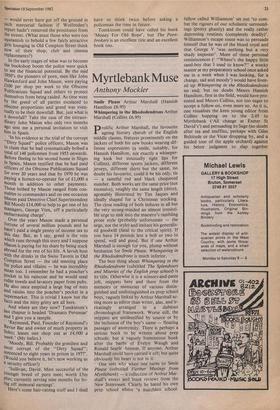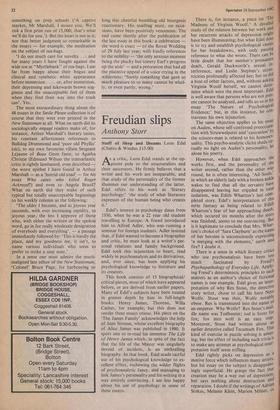Myrtlebank Muse
Anthony Mockler
Prolific Arthur Marshall, the favourite ageing literary cherub of the English middle classes, features prominently on the jackets of both his new books wearing dif- ferent expressions (a smile, suitably, for Hamish Hamilton, not exactly a whimper- ing look but unusually tight lips for Collins), different sports jackets, different jerseys, different shirts but the same, no doubt his favourite, could it be his only, tie — a tasteful red and black chequered number. Both works are the same price (not excessive), roughly the same length (ditto), agreeably illustrated by Tim Jaques and ideally shaped for a Christmas stocking. The close reading of both induces in all but the very strong-minded an almost irresisti- ble urge to sink into the maestro's rambling prose style (probably unfortunate — the urge, not the style) and imitate his generalis- ed goodwill (fatal to the critical spirit). If you have 14 pounds less a bob or two to spend, well and good. But if one Arthur Marshall is enough for you, plump without hesitation for Smile Please. Whimpering in the Rhododendrons is much inferior.
The best thing about Whimpering in the Rhododendrons (subtitled The Splendours and Miseries of the English prep school) is its title. Otherwise it is a scissors-and-paste job, snippets here and there from the memoirs or memories of various distin- guished and undistinguished ex-prep school boys, vaguely linked by Arthur Marshall ac- ting more as editor than writer, alas, and ir- ritatingly arranged in a dubious chronological framework. Worse still, the snippets are unidentified by source or by the inclusion of the boy's name — floating passages of anonymity. There is perhaps a serious book to be written about prep schools; but a vaguely humourous book after the barbs of Evelyn Waugh and Ronald Searle -hmmm. If anyone, Arthur Marshall could have carried it off; but quite obviously his heart is not in it.
One sees why when one turns to Smile Please (subtitled Further Musings from Myrtlebank) — a collection of Arthur Mar- shall's essays and book reviews from the New Statesman. Clearly he hated his own prep school where 'a matchless school- fellow called Williamson' set out `to com- bat the rigours of our scholastic surround- ings (pretty ghastly) and the really rather depressing routines (completely deadly)'. Williamson's escape route was to persuade himself that he was of the blood royal and that George V 'was nothing but a very shady imposter'. More of these personal reminiscences (` "Where's the happy little sand-boy that I. used to know?" a wonky master at my preparatory school once asked me in a week when I was looking, for a change, sad and moody') would have liven- ed up Whimpering in the Rhododendrons no end; but no doubt Messrs Hamish Hamilton, first in the field, would have pro- tested and Messrs Collins, not too eager to accept a follow-on, even more so. As it is, one visualises the keen young editor from Collins hopping on to the 2.05 to Myrtlebank (`All change at Exeter St David's') and persuading its Sage (no doubt after tea and muffins, perhaps with Giles Bultitude or the Vicar dropping by, and a guided tour of the apple orchard) against his better judgment to slap together
something on prep schools ('A captive market, Mr Marshall, I assure you. We'll risk a first print run of 15,000, that's what we'll do for you.'). But the heart is not in it; nor that better judgment so remarkable in the essays — for example, the meditation on the subject of tea-bags.
'I do not much care for novelty ... and for many years I have fought against the wide use at "Myrtlebank" of tea-bags. I am far from happy about their bogus and clinical and synthetic white appearance before immersion .... or, after immersion, their depressing and lukewarm brown sog- giness and the unacceptable feel of them when they find their way into the trash can'. Yes.
The most extraordinary thing about the 48 essays in the Smile Please collection is of course that they were ever printed in the New Statesman at all. What on earth did its sociologically engage readers make of, for instance, Arthur Marshall's literary tastes, his constant affectionate references to Bulldog Drummond and 'poor old Phyllis' (sic), to my own favourite villain Sergeant Lejaune of Beau Geste fame, to Agatha Christie (Edmund Wilson the transatlantic critic is rightly lambasted, even described the worst epithet I have found in Arthur Marshall — as a 'horrid old toad' — for his essay Who cares who killed Roger Ackroyd?) and even to Angela Brazil? What on earth did they make of such typical but totally unacceptable beginnings to his weekly column as the following:
'The older I become, and as joyous year succeeds, with ever increasing rapidity, to joyous year, the less I approve of those who, with either the written or the spoken word, go in for really wholesale denigration of everybody and everything'. — a passage immediately followed by: 'This is hardly the place, and my goodness me, it isn't, to name various individuals who seem to prefer to strike a sour note.'
In a sense one must admire the much- maligned late editor of the New Statesman, 'Colonel' Bruce Page, for harbouring so
long this cheerful bumbling old bourgeois reactionary. His mailbag must, on occa- sions, have been positively venomous. The end came shortly after the publication of the last essay in this book: a celebration the word is exact — of the Royal Wedding of 29 July last year; with kindly references to the nobility — 'the only anxious moment being the plucky but tottery Earl's progress up the aisle' — and a peroration that had all the plaintive appeal of a voice crying in the wilderness: 'Surely something that gave so much pleasure to so many cannot be whol- ly, or even partly, wrong.'



































 Previous page
Previous page